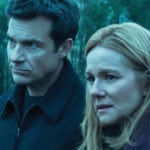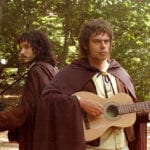 Technology
Technology  Technology
Technology  Misconceptions
Misconceptions 10 Hilarious (and Totally Wrong) Misconceptions About Childbirth
 Weird Stuff
Weird Stuff 10 Warning Labels That Exist Because Someone Actually Tried It
 Health
Health Ten Confounding New Inventions from the World of Biomedicine
 Creepy
Creepy 10 Death Superstitions That Will Give You the Creeps
 Movies and TV
Movies and TV 10 Movies That Get Elite Jobs Right, According to Experts
 Weird Stuff
Weird Stuff 10 Times Real Laws Were Based on Bizarre Hypotheticals
 Animals
Animals 10 Inspiring Tales of Horses Being Human
 Mysteries
Mysteries Top 10 Haunting Facts About the Ghost Ship MV Alta
 History
History 10 Surprising Stories About the Texas Rangers
 Technology
Technology 10 Awesome Upgrades to Common Household Items
 Misconceptions
Misconceptions 10 Hilarious (and Totally Wrong) Misconceptions About Childbirth
 Weird Stuff
Weird Stuff 10 Warning Labels That Exist Because Someone Actually Tried It
Who's Behind Listverse?

Jamie Frater
Head Editor
Jamie founded Listverse due to an insatiable desire to share fascinating, obscure, and bizarre facts. He has been a guest speaker on numerous national radio and television stations and is a five time published author.
More About Us Health
Health Ten Confounding New Inventions from the World of Biomedicine
 Creepy
Creepy 10 Death Superstitions That Will Give You the Creeps
 Movies and TV
Movies and TV 10 Movies That Get Elite Jobs Right, According to Experts
 Weird Stuff
Weird Stuff 10 Times Real Laws Were Based on Bizarre Hypotheticals
 Animals
Animals 10 Inspiring Tales of Horses Being Human
 Mysteries
Mysteries Top 10 Haunting Facts About the Ghost Ship MV Alta
 History
History 10 Surprising Stories About the Texas Rangers
Top 10 Greatest TV Documentary Series
In our less-and-less-literary age, TV has gradually become the primary font of wisdom for the great mass of population – most of us get our news from television network and cable sources, for example. Commentators on culture and society have often tried—almost since television’s invention—to raise the alarm about this growing tendency of ours to look to the small screen for all of our news and entertainment. Their efforts have proved unsuccessful, as we know–TV nearly laid low the film industry in the 1950s, and TV and the internet together have beaten print media pretty well into submission.
Not all is bad in TV-land, however; even in the midst of an ocean of meaningless and inane fluff, television has at times managed to fulfill its early promise of bringing knowledge and learning to a mass audience. Sometimes through government-mandated regulation, sometimes through the simple desire of a few wise individuals to raise the standard a little.
So was born the television documentary series, and what follows is a list of the ten greatest of these that went out across the airwaves over the last forty years.
10. The Body in Question
Jonathan Miller’s History of Medicine, in 13 parts, presented in 1978 on the BBC and on PBS stations in America. Miller, in the series, used a combination of visual images and lecture-like presentations to not only trace the history of medicine, but to explain the working of the human body in entertaining ways. The excerpt is a perfect example, where old friend Dudley Moore is enlisted to help explain the mystery of dexterity.
9. Victory at Sea Buy Now
One of the earliest television documentary series and one of the first dealing with WWII, Victory at Sea used extensive archival footage—up to that point unseen by the public—taken during the war, to illustrate the long naval struggle that helped bring Allied victory—from the Battle of the Atlantic to the island hopping campaigns in the Pacific. What helped make the series even more memorable was the participation of composer Richard Rodgers, who wrote the stirring theme music.
8. The Civil War Buy Now
Ken Burns’ well-known and highly acclaimed series that made a star out of author Shelby Foote, whose commentary is one of the most enjoyable and fascinating aspects of each episode. Touching, poignant, fascinating – The Civil War is viewed today as not only Burns’ best work, but it became the new standard for history-related television documentaries. With David McCullough’s excellent narration and the period music, this series became one of PBS’ most popular ever.
7. The Ascent of Man Buy Now
Jacob Bronowski’s essay on the scientific progress of man since his very beginnings, this series was one of the original, groundbreaking triad produced for BBC 2 in the late sixties/early seventies (the other two being Civilisation and Life on Earth).
This excerpt, though it cuts off at the end, is a powerful statement delivered at the site of Auschwitz, the Nazi concentration camp.
6. The Undersea World of Jacques Cousteau
For the first time in television history, viewers were taken, in color, under the waves, into the depths of the ocean and around the world to examine marine life, learn about the fragile nature of our oceans, and the natural world that is dependent on the sea. At turns narration is delivered (until his tragically early death in 1975) by Rod Serling—with his authoritatively pitched and often-imitated voice—and Cousteau himself, who gives the occasional commentary with his characteristic Gallic accent, as equally imitated as Serling’s. Cousteau’s often-poetic words, rolling in the ear like the echo inside a chambered nautilus, remind us that he was not merely the inventor of the aqualung, not merely an ocean- and nature-conservationist, but also a man of deep feeling and tremendous wisdom; skilled not only with diving equipment and camera, but also with conveying to us, the audience, the fascination, wonder and respect he felt for the silent world whose exploration he had helped pioneer.
5. Alastair Cooke’s America
Another of the early great BBC color documentaries, this one was author Alastair Cooke’s paean to America, his adopted home. In 13 parts Cooke examined the history of the United States from colonization up to the societal upheaval of the 1970s.
Another truncated clip, but the only one, sadly, that I could find.
4. The World at War Buy Now
With amazing interviews and archival footage, this near-definitive documentary series covered all of WWII from the pre-war days in Germany, Japan and Italy, up to the very end, with the dropping of the atomic bombs on Hiroshima and Nagasaki. Laurence Olivier’s softly intoned narration set an ever-present mood of the tragedy taking place in each episode, so that the series seemed often bleak and hard to take… but this is the way, one can argue, that war ought to be presented.
I remember this series in my childhood and youth, and it never failed to haunt me—from the opening theme music and montage, to the stark footage, to Olivier’s voice moving through it all, with a sort of implied sadness which one begins to share with each successive viewing.
3. The Blue Planet Buy Now
From an underwater lake to close-up photography of sharks and a blue whale, to a fascinating trip into the black abyss, this is my favorite of David Attenborough’s documentaries on the life of our planet. His first was the historic Life on Earth, followed by series such as The Life of Mammals, Planet Earth and of course The Blue Planet—each series full of such beautiful film work that I was hard-pressed to pick one of them. One of the greatest things about The Blue Planet is its stirring score, and the feel it gives for the epic drama of the oceans.
2. Cosmos: A Personal Voyage Buy Now
Carl Sagan’s master work, one might say; the synthesis of ideas he’d presented in his various books up to that point, from The Dragons of Eden to Broca’s Brain. With great depth and yet with the care and elegance of an accomplished teacher, Sagan presents us with the wonder of the cosmos—all that is, or ever was, or ever will be. Similar to Cousteau in his use of occasionally near-poetic prose, Sagan’s program took countless viewers out into the void of space and inwards to the atom, and beyond.
Partly an exploration of the universe, partly an exploration of his philosophies of science and life, and partly a loving tribute to the men of learning and wisdom he admired (most notably Johannes Kepler, who first brought us understanding of how the planets move around the sun, and Eratosthenes, the ancient Greek scientist who first determined the circumference of the earth), Cosmos is one of the most poignant and moving television documentaries ever made—in no small measure due to the lovely musical score and (for the time) excellent computer-animated effects. Like most of the series on this list, it holds up today every bit as powerfully and successfully as when it was first broadcast.
1. Civilisation: A Personal View Buy Now
It was truly difficult to choose between this series, the first documentary broadcast on the then-newly created BBC 2, and Cosmos, one of the widest-ranging and most wondrous (and life-affirming) of all these selections… but Kenneth Clark’s Civilisation wins out, for me, not only because of its historical importance (predating all other documentary series on this list with the exception of Victory at Sea) but because of the erudite skill and faith exhibited by its creator-host. Clark’s adeptness before the camera is matched by the unadorned elegance of his words, presenting, with a combination of wit and commanding brilliance, his views on how the art of civilization progressed from the fall of Rome to modern times. His manner is that of the friendly and gentle schoolmaster, and his love for the great heroes of civilization which he admires is plainly evident. His descriptions of the works (and person) of Antoine Watteau, for example, are done with delicate perception and poignancy, and it’s this style of Clark’s, more than anything, for which he became widely and rabidly admired towards the end of his life. Indeed, Civilisation was a wildly popular series (for a documentary) bringing Clark acclaim and attention which he’d never imagined he’d receive. (David Attenborough tells, in the DVD release of the series, of the time when Clark came to America for a public appearance. Experiencing the overwhelming adulation of the crowds of people that flocked to see him, Clark had to escape into a bathroom, where he cried for several minutes).
Proof of the magic worked on the mind and senses by this program—my thirteen-year-old daughter will sit, without encouragement from me, watching it, enraptured—not only because of the beautiful paintings, architecture, and music—but also because of the wonderful grandfatherly air of Kenneth Clark. She was deeply (if momentarily) saddened when I told her that he’d been dead for many years now. Such teachers–such lovers of knowledge and art–are rare.
I earnestly counsel anyone who hasn’t seen this series, and is in any way interested in the history of art and of Western Civilization, to go out and buy it or rent it. In my opinion its power to move and fascinate, to instruct and inspire, has not diminished in the slightest in the nearly forty years since its production.
Contributor: Randall








